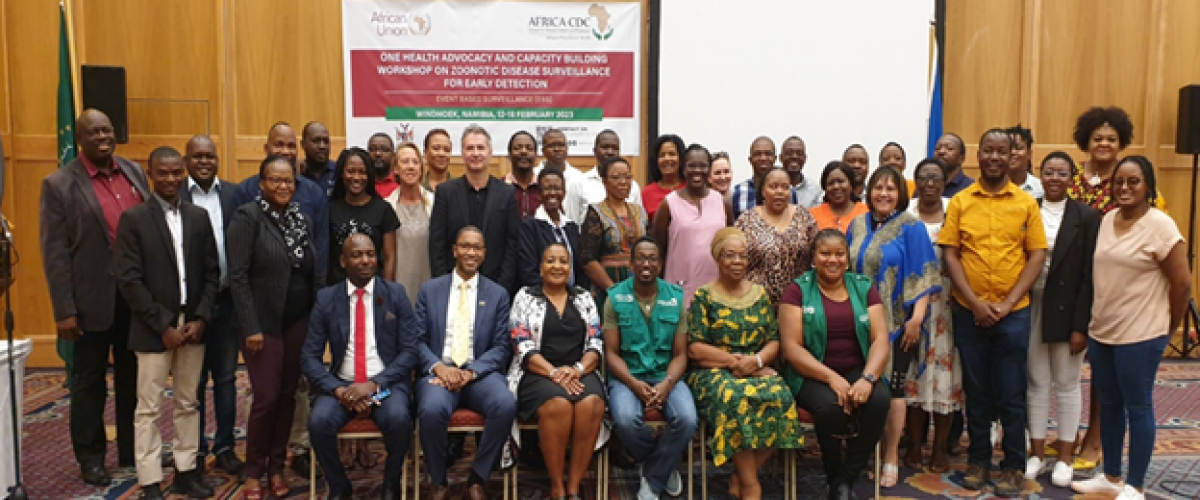
Introduction
In 2020, Namibia made a pivotal move to strengthen its health security by launching the National Action Plan on Health Security (NAPHS). Spearheaded by the Ministry of Health and Social Services (MOHSS), the plan aimed to enhance multi-sectoral collaboration through a One Health approach, aligning Namibia with the core capacities of the International Health Regulations (IHR) 2005.
Key ministries—MOHSS, the Ministry of Agriculture, Fisheries, Water, and Land Reform (MAWFLR), and the Ministry of Environment, Forestry, and Tourism (MEFT)—collaborated to initiate several One Health-focused projects. This included planning activities and early discussions around the establishment of a National One Health Institute, which was further bolstered by a benchmarking mission to Zambia and South Africa.
Despite this progress, the initiative initially faced hurdles- with Ministries often operating within their individual mandates, resulting in fragmented efforts and disjointed resource allocation and ineffective response to disease outbreaks.
As Minister of Health and Social Services, Dr. Kalumbi Shangula, noted:
'In the Namibian context, the need for the One Health approach is evidenced by the frequently reported outbreaks of zoonotic diseases, coupled with the effects of climate change. 75% of emerging pathogens that are known to cause epidemics affecting humans are of zoonotic origin.'
His statement highlights the urgency of adopting an integrated, One Health-driven approach to tackle emerging health threats in Namibia. In recognition of the existing gap, MOHSS under its Public Health Division, spearheaded the conceptualization of the Namibia Public Health Institute (NAMPHI). The idea gained traction, drawing support from diverse stakeholders.
A Shift towards integration and evidence of the change
Namibia’s One Health landscape has undergone tangible transformation. What was once a fragmented effort is now evolving into a coordinated effort, driven by stronger collaboration across ministries and stakeholders. Improved communication and joint planning culminated in the endorsement of the Namibia Public Health Institute, nested under MOHSS, and the ongoing development of an independent National One Health Institute.
Despite challenges, NAMPHI has been instrumental in championing the One Health agenda. Proposals to elevate its status—possibly to be housed under the Office of the Prime Minister (OPM) - are being considered to enhance its impact.
A major milestone was achieved on 19 June 2024, with the launch of the Tripartite National One Health Strategy (2024–2028). This legal framework sets out a roadmap for coordinating One Health initiatives across sectors.
Dr. Yewande Alimi, One Health Unit Lead at Africa CDC, praised the effort:
'We applaud the strong political commitment by the Ministers of Health and Social Services, Environment, Forestry and Tourism, and Agriculture, Water, Fisheries and Land Reform as they launched this national strategy to strengthen One Health in Namibia.'
The strategy is poised to enhance Namibia’s capacity to prevent, predict, detect, and respond to health threats. It targets zoonotic, vector-borne, and neglected tropical diseases, while also reinforcing health systems and promoting sustainable development.
Key collaborative activities that laid the foundation for the National One Health Strategy include:
- Desktop review and baseline survey (Nov 2022)
- Key informant interviews (Jan–Feb 2023)
- Joint MOHSS–Africa CDC meeting (Feb 2023)
- Stakeholders’ focus group discussions (May 2023)
- Net Mapping analysis (Aug 2023), which identified MOHSS as the most influential actor in coordinating One Health institutionalization
- Validation workshop (Jan 2024)
These activities align with COHESA’s mission to foster cross-sectoral collaboration between government bodies and stakeholders across society.
Reflections on progress
Namibia’s journey towards a robust One Health system underscores the value of multisectoral collaboration. The positive momentum can be attributed to MOHSS’s leadership and the unwavering support from MAWFLR and MEFT. The line ministries’ ability to communicate, coordinate, and collaborate has been instrumental to the success of the initiative so far.
Various partners have played significant roles in the process, including:
- University of Namibia (UNAM) – COHESA team
- Africa CDC
- Friedrich-Loeffler-Institut (FLI)
- Robert Koch Institute (RKI)
- Food and Agriculture Organization (FAO)
- World Health Organization (WHO)
Strong political will has laid the groundwork, however sustained financial, technical, and human resource support will be essential. Equally important is communication and community engagement - critical factors in ensuring the success of the national One Health strategy.
Conclusion
Namibia’s One Health journey demonstrates a significant shift towards a more integrated and collaborative health system. Driven by strong political will, committed stakeholders and supported by partners like COHESA and others, the country is well-positioned to transform this momentum into lasting, systemic change.
Links to Key One Health Documents and Events
1. Strategy Launch and Institutional Efforts
- UNAM’s Visible Efforts in Building One Health Capacity in Namibia – UNAM Forum Online
- UNAM’s Contributions to the Launch of the National Tripartite One Health Strategy (2024–2028) – The Namibian
2. Media and Capacity Building
3. Community Engagement and Initiatives
- UNAM Cares Launches One Health Community Engagement Initiative in Tsumkwe – UNAM Forum Online
- Strengthening Food and Feed Production through One Health Gardening in Dordabis – UNAM Forum Online
4. Publications and Reports
- Namibia OH Landscape: Challenges, Opportunities and Collaborative Strategies – One Health Cases (CABI Digital Library)
- Towards Institutionalization of One Health in Eastern and Southern Africa – CABI Digital Library